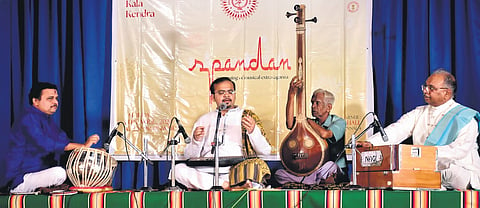

CHENNAI: In melodies of the Indian classical, bloomed the opulent walls of the Raga Sudha Hall with Spandan, an evening of musical extravaganza by the Pracheen Kala Kendra. Graced by a symposium of veterans from across India, including Iman Das, Hindustani vocalist, M Narmadha, violinist-musicologist, Pt. Chetan Joshi, a renowned Hindustani classical flautist, and other fine accompanists, the Kendra inaugurated its Chennai Chapter dedicated to promoting and preserving the Indian classical arts through teaching, training, and examinations.
Expanding its reach with over 100 affiliated study centres across south India, the nonprofit, non-governmental organisation now extends its mission into Tamil Nadu, seeking to universalise arts education, orchestrate vibrant cultural events, and even foster economic empowerment by nurturing the talents of aspiring visual and performing artistes.
Inspired by the rich culture and heritage of the city, Sajal Koser, secretary, PKK shares, “Chennai is a central place of utmost vibration and energy for the Indian classical music and dance. It embodies a cultural legacy of art with eminent and remarkable artists, organisations, and institutions that stand as a driving force for PKK to involve Chennai’s local artists and students into its fold.”
Harmony in tradition
Honouring its tradition of promoting Indian classical music, Saturday evening unfolded with a resonating vocal recital by Iman Das, who also runs the Omkar Music Academy in Bengaluru.
Hailing from the Patiala Gharana (singing style), he is known for embracing other styles of music, evident in his recital of raga Sanmukhapriya, a derivative of Carnatic music, with a self-composed composition, Madhurdhawani suni in Rupak taal, accompanied by Keshav Joshi on tabla and Pt Devendra Verma on harmonium.
“As legends say, anything that pleases the kaan (ear) is music. Soon, we will witness a new format coming up where there’s no difference but a basic point where all the styles would meet and that’s what I am working on,” says Iman, who aims to do this through the book he co-wrote called Reimagining One Nation, One Music.
As the evening drew to a close, what came together with the fusing tonalities and tempos was the two-dimensional jugalbandi between the facets of Indian classical music. Rendering the divine threads of these art forms, the performance enunciated the common ragas of Kalyani and Sindhu Bhairavi, popularly known as Yaman and Bhairavi in Hindustani, by four eminent artistes including Narmadha, Pt Chetan Joshi, Mannarkoil Balaji, mridangist and Chandrajit, tabla player.
“The ensemble conveys a global message of how music has no language, no barrier, no caste or creed. Just like the two eyes of the divine mother, it manifests in two forms which perceive the world as one,” says Namradha, heralding it as a unifying medium.